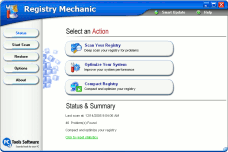Answer
Thanks, Cass! As you probably know, we've long been recommending that
everyone have at least two (or more) anti-spy*ware programs. The reason for
this is simple, anti-spy*ware software hasn't completed going through its
growing pains yet. There are many more "bad" anti-spy*ware program out there
than there are good ones. There are even anti-spy*ware programs that are
spy*ware/adware themselves.
Many people think of anti-spy*ware
programs in the same way as they do anti-virus programs. There are not many
similarities really but vendors like Symantec and McAfee don't do much to
end the confusion; rather they exacerbate it by bundling a bunch of
unrelated programs into a suite that includes both anti-virus and
anti-spy*ware. Still, no matter what these vendors put together,
anti-spy*ware and anti-virus are different kinds of programs.
Sure, both have "definition files"
and both of them need to be updated frequently to protect you adequately.
But anti-virus software has been around for two decades while most
anti-spy*ware software hasn't even got a full decade under its belt. And, it
can harm your computer to run two different anti-virus programs. So don't do
it. You don't need to because anti-virus software is in its adulthood and
(most) anti-virus programs are quite effective because they've matured.
Anti-virus program can be effective against a broad range of viruses and
worms because most viruses and worms generally all have specific
functionalities that make them identifiable.
But spy*ware is proliferating
wildly as spy*ware developers figure out new ways of making money from your
computer. Spy*ware is adware and adware is spy*ware these days. Once upon a
time adware was, for the most part, innocuous. Today, there's not a nickel's
worth of difference between what some call "spy*ware" and what some call
"adware". And, since everyone seems to be afraid to call a spade a spade, we
still have not one single definition of adware or spy*ware that everyone can
point to and say "This is it!".
Until the day comes when most
everyone "in the know" agrees upon a standard definition of spy*ware (and
adware) and what specific functions a program must manifest in order to be
spy*ware (or adware) we're all going to have to bumble along the best we
can. No two anti-spy*ware programs agree on what constitutes spy*ware and
whether or not certain types of adware should be removed. Add to this the
number of spy*ware vendors who threaten to sue anti-spy*ware developers -
and you have a really tangled web.
And one more thing. Let's not
forget about the new mantra of the Internet - MONEY. Miscreants don't write
viruses or worms for the most part to make money. They do it because they
can. The get a kick out of harming people's computers and being recognized
by other miscreants for deeds well done (harming computers and getting
noticed on the evening news). All spy*ware/adware developers write spy*ware
and adware programs for one reason, to harvest your computer in order to
make huge amounts of money. And they'll use every trick in the book to get
you to install their garbage on your computer.
Regardless of what you read or
hear, we're telling your straight up: Internet Explorer security flaws or
holes are not the reason so many people are infected with spy*ware and
adware. So many people are infected with adware and spy*ware because they
were gullible enough to take the bait and install the spy*ware or adware on
their computers. Still, sometimes one can be infected without specifically
downloading spy*ware or adware but this normally happens when a non-spy*ware
program bundles spy*ware or adware with their application. This is yet
another genre of spy*ware/adware distribution and one that has not, we're
afraid, reached its full menacing potential.
So until the right group of people
"in the know" sit down and determine a definition of spy*ware and adware
that everyone can agree on, we're going to be stuck with having to use two
or three anti-spy*ware programs to make sure our computer are clean.
We have recommended SpySweeper and
Spy*ware Doctor for a long time. We've also recommended Spybot Search and
Destroy for a long time. We've long since stopped recommending Ad-Aware
because they have, in our opinion, sold out. By "sold out" we mean when they
were threatened with lawsuits by some adware/spy*ware vendors, they gave in
and stopped detecting those spy*ware/adware applications. Now we see that
Ad-Aware is being sold as boxed software in stores everywhere. This tells us
that money was more important to Ad-Aware than protecting its users. And
until we find out otherwise we will not recommend or endorse Ad-Aware.
So keep using your anti-spy*ware
programs and remember that you're going to see different results with
different anti-spy*ware applications. You can bet your computer is clean and
not infected with spy*ware if you're using Spy*ware Doctor, SpySweeper and
Spybot Search & Destroy. We strongly recommend that you don't allow more
than one to run in the background. Choose one and make it your main line of
defense. Use the other two as secondary anti-spy*ware programs and run scans
with them two or three times weekly. And before scanning, always make sure
you update the anti-spy*ware "definitions" and also check for program
updates too.

